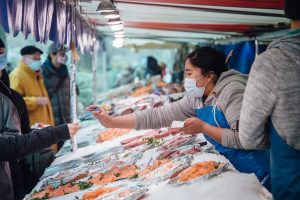الملاحظات التقييمية الرسمية على الحوارات إلى قمة الأمم المتحدة للنظم الغذائية لعام 2021
نوع الحوار
بدعوة من
لغة فعالية الحوار
التاريخ/الوقت
إلى:
نطاق التركيز الجغرافي
التنسيق
يُرجى مراجعة التفاصيل أدناه للحصول على معلومات التسجيل إذا كانت متوفرة أو الاتصال بمنظم الحوار إذا كنت ترغب في الحضور.
القيّم
الوصف
COVID-19 is having a major impact on households’ production and access to good quality, nutritious food, due to losses of income, combined with increasing food prices, and restrictions to movements of people, inputs and products. The hardest hit in both rural and urban areas are frequently women and those who work in informal economies. This dialogue will focus on drawing out the lessons and priority actions that need to be taken to respond to food security challenges in a way that addresses informality and gender dynamics, for food systems to become resilient, equitable and sustainable into the next decade.
The dialogue will bring together a range of stakeholders and perspectives on the impact of the C-19 pandemic on food systems and livelihoods, focusing on the evidence and experience generated from the most affected communities in low- income countries to generate ideas for action.
This event has been co-convened by Canada’s International Development Research Centre (IDRC), the Institute of Development Studies (IDS) and the Australian Centre for International Agricultural Research (ACIAR).
Over the past 12 months, Canada’s International Development Research Centre (IDRC) invested around 55 million CAD to support more than 60 research projects to respond to the COVID-19 pandemic. Over twenty of these projects working across Latin America, Sub-Saharan Africa, and Asia are generating the evidence required to understand how the COVID-19 pandemic impacted food systems and livelihoods of the most vulnerable, and to support responses that promote more inclusive and resilient food systems.
Over the past year, ACIAR has supported research on the impacts of the COVID-19 pandemic on food systems in the Indo-Pacific region, primarily from the perspective of smallholder farmers and fishers. We have commissioned a multistage assessment of COVID-19 impacts, the first stage of which rapidly developed a picture of food system vulnerabilities that helped inform our response and support to affected projects. The final stage of assessment will be released later this year, and will consider the ongoing impacts of the pandemic for affected communities. ACIAR remains committed to boosting resilience of agricultural systems during this time, and has funded 40 small projects through our alumni network to ensure continued support for local food security in our partner countries.


